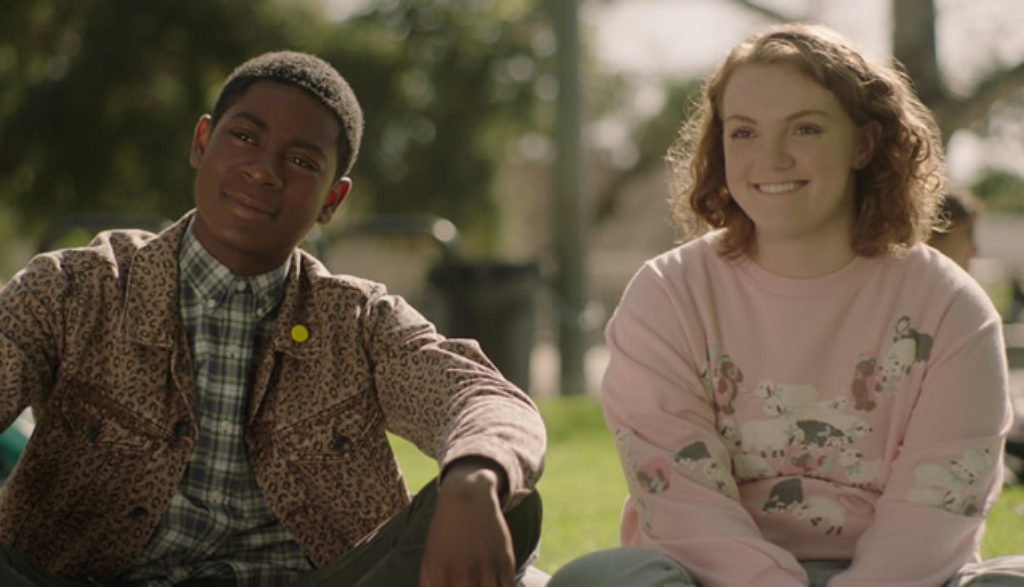
Sierra Burgess is the definition of average.
She’s not the coolest, not the thinnest, not the funniest. But she’s gotta be something (and fast), because her Stanford résumé isn’t going to bolster itself.
So one night as she’s sitting in her room, she gets a text from this guy. And not just any guy, but the guy. Jamey, the high school quarterback.
Cute, popular, funny—why would he be texting Sierra?
Maybe it’s a case of mistaken identity. Maybe he thinks she’s this stunning cheerleader named Veronica. Well, Sierra knows she should tell the truth about who she really is. But, after all, he was the one who texted her. So she texts him back. And he clearly kinda likes her … more and more with each text, in fact.
Jamey’s not really interested in Veronica, Sierra rationalizes as things get more intense. Not when he’s falling in love with Sierra’s words.
Obviously, Sierra is gonna need some help. So she offers to tutor Veronica. The deal? Sierra will tutor Veronica to help her look smarter for her college boyfriend if Veronica will go on dates with Jamey, pretending to be Sierra.
But you can only sustain a romance based on false pretenses and false appearances for so long. Luckily for Sierra Burgess, Jamey really is falling for her … the person she is on the inside.
Despite the core deception driving this movie’s plot, Sierra Burgess isn’t a loser. She’s got some great qualities: Sierra’s funny, smart, resourceful and determined to succeed. She’s not obsessed with her looks. In fact, she focuses on her intellect over her appearance.
This film emphasizes the fact that outward appearance and physical beauty aren’t what matters most, a positive message for teen girls in particular. What really matters, the film says, is who you are as a person, because character will last even as beauty fades.
Sierra mostly knows this to be true. She is, initially, the epitome of self-confidence. She says to herself in the mirror, “You are a magnificent beast.” And Sierra and Jamey’s relationship deepens not because of how she looks, but because they have a real relational connection that goes past the physical.
Unlike other teen movies in which parents and other adults often seem absent from the lives of young characters, the same can’t be said of this one. Sierra’s parents love and support her, and they speak encouraging words over her. They also make sure there are consequences for her actions, such as grounding her for inappropriate behavior.
Sierra’s parents also emphasize the importance of loving yourself for who you are and encourage their daughter to develop her mind and intellect. Sierra’s English teacher also encourages her work as an artist and shows concern when Sierra begins to act contrary to her true nature. That overlapping combination of the positive role models and influences in Sierra’s life helps her to love herself and to nurture big dreams (such as eventually going to Stanford University).
This film also shows characters learning about others, specifically those who tear others down due to their own insecurities and issues. Eventually, a number of people learn to look past these shallow facades.
Jamey, Sierra’s crush, is actually a really kind guy (which is portrayed as an atypical quality for a “jock”) who wants to get to know a girl for her personality. He is also a good brother who spends time playing and hanging out with his younger brother, who is deaf.
Veronica, the cheerleader Sierra offers to tutor, is initially mean but slowly learns how to value herself and those around her. Sierra’s best friend, Dan, is also a stand-up guy. He warns Sierra to be truthful and honest and to be careful about who she communicates with on social media. He is also quick to support her endeavors and to forgive her failings as well.
Teenagers talk honestly about the high parental expectations they feel obligated to meet.
Sierra and Veronica discuss the fictional character Dorian Gray losing his soul, as well as talking about the ideas of various philosophers.
Sierra’s best friend, Dan, jokingly tells her that a texting conversation could lead to “hand holding and then teen pregnancy.”
Veronica crudely talks about bodily fluids and flashing a man while on vacation. Veronica’s ex-boyfriend tells someone that he manipulated her to feel insecure so that she’d want to have sex with him. We never find out if that happened. But the guy takes a picture while kissing her and then uses it to break up with her, perhaps suggesting that she didn’t give in to his ploy.
Guys and girls kiss numerous times. Some teen girls wear bikinis and other revealing outfits. (We see one wrapped in a towel.) Guys go shirtless and one guy sends a picture of himself sans shirt to a girl. (They also exchange other flirtatious texts.) A girl flippantly suggests sending a “nude” to a guy.
It’s suggested that a girl isn’t getting any texts back from a guy she likes because her crush might “be married or gay.” Jamey jokingly says guys are “the superior sex.” A girl snidely comments that a female classmate can share her “trans experience.” Others joke about being lesbian, gay and a hermaphrodite. A teacher makes a comment about fertility and a girl using birth control. The phrase “Real women have curves” is referenced.
We hear multiple references to gender equality and being free to be attracted to whichever gender you so choose, with an adult authority figure saying that they’re “both … equally valid choices.”
Some might question how realistic the teen romance at the center of this movie really is. (Though, admittedly, the same could be said of many—if not most—romcoms.)
Someone jokingly says “slit my veins.” Others quip casually about “rapists,” “serial killers” and “waterboarding.” Veronica’s mother repeatedly jokes about her husband dying. Veronica tells Sierra to be “normal or you can just die alone.” Dan watches a scary movie where a girl gets stabbed in the stomach.
God’s name is abused four times, while Jesus’ name is misused once. The s-word is heard nearly 10 times. Veronica silently mouths an f-word. Other profanities include “d–n,” “a–,” “h—” and “b–ch.”A man refers to his male date by the British vulgarity “w-nker.”
A teacher assumes students will use their homework as “rolling paper” for joints, and other comments are made about teenagers “smoking pot.” Sierra and Veronica attend a party where teens and college students drink beer and hard liquor and participate in keg stands. (Sierra gets drunk there herself.)
If there’s one thing movies geared toward teens have taught us, it’s that adolescent girls can be very mean. They often gossip, laugh at inappropriate times, say harsh things and try to make their “competitors” feel small and worthless. There are also a lot of rude comments made about weight to make girls feel insecure. And we see lots of that nasty behavior here.
Veronica’s mother, for a short time, also becomes one of those “mean girls.” We learn that her husband left her for a much younger woman, so she now (from a place of unresolved hurt and insecurity) forces her daughters to compete in beauty pageants and focuses on their outward beauty (while ignoring their intellect).
Most of the time, Sierra isn’t one of these mean girls, but she still makes some poor choices at certain points. She “catfishes” a guy (texting someone who is unaware of your identity), lies to and ignores her friends, and angrily posts an embarrassing picture of someone on Instagram.
Someone makes a racist joke. Another character wipes his nose on his hand and belches, and two people vomit after exercise.
Sierra Burgess is not a loser.
Instead, she’s known for her character and intelligence, not for her superficial charms. She has engaged, intentional parents who encourage her to love herself just as she is (which can be seriously tough as a high school girl—or as a woman in general). She develops strong relationships and is kind to others even when they’re not kind to her. All in all, Sierra Burgess Is a Loser hammers at the idea that women, be they teens or adults, shouldn’t let society definite them by their physical beauty.
It’s a solid message, because our culture’s impossible standards often wreak havoc on so many people—young and old alike.
But …
… it’s not all good news here. The sexual innuendo in this Netflix romcom isn’t as problematic as, say, The Kissing Booth. Still, sex is definitely talked and joked about. And various characters reinforce the idea that teens can love anyone they desire, regardless of gender. We also have some language concerns as well as depictions of teen drunkenness (not to mention jokes about marijuana).
So even though Sierra Burgess isn’t a loser, this movie still has some “loser” moments mixed amid its themes of self-acceptance.

Kristin Smith joined the Plugged In team in 2017. Formerly a Spanish and English teacher, Kristin loves reading literature and eating authentic Mexican tacos. She and her husband, Eddy, love raising their children Judah and Selah. Kristin also has a deep affection for coffee, music, her dog (Cali) and cat (Aslan).